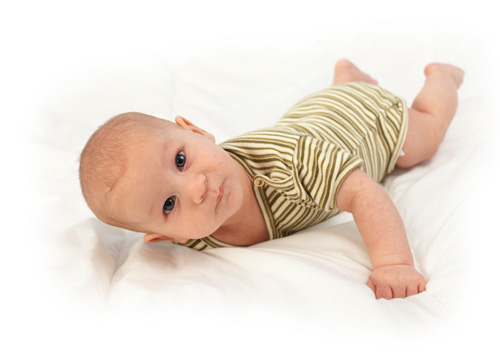What to Expect as Your Child Grows:
Well Child Care at 2 Months
Feeding

- At this age, your baby needs only breast milk or infant formula to grow healthy and strong. At this age most babies take about four to six ounces of formula every three to four hours.
- Even if you only give your baby breast milk, it is a good idea to sometimes feed your baby with pumped milk that you put in a bottle. Then your baby will learn another way to drink milk and other people can enjoy feeding your baby.
- Always hold your baby during feeding time. Then your baby learns you are there to meet his needs. This is an important and special time. It is not time to start cereal or baby foods yet. Cereal can be started at four to six months of age.
Development
- Babies start to lift their heads briefly.
- They reach for things with their hands. They enjoy smiling faces and sometimes smile in return.
- Cooing sounds are made in response to people speaking gentle, soothing words.
Sleep
- Many babies wake up every three to four hours, while others sleep for longer periods during the night. Every baby is different.
- Feeding your baby a lot just before bedtime doesn’t have much to do with how long your baby will sleep.
- Place your baby in the crib when he’s drowsy but still awake.
- Do not put your baby in bed with a bottle.
- Ask your healthcare provider for ideas about ways to keep your baby alert and awake during the day and sound asleep at night.
Reading and Electronic Media
Your newborn will enjoy hearing your voice. You can read aloud while feeding or cuddling with the baby. The time you spend reading to your infant is far more important than the book itself.
Safety Tips
- Never leave your child alone, except in a crib.
- Choking and Suffocation
- Use a crib with slats not more than 2 and 3/8 inches apart.
- Place your baby in bed on his back.
- Use a mattress that fits the crib snugly.
- Keep plastic bags, balloons, and baby powder out of reach.
- Bumper pads are no longer recommended.
- Keep mesh netting of playpens in the upright position. - Fires and Burns
- Never eat, drink, or carry anything hot near the baby or while you are holding the baby.
- Turn your water heater down to 120° F (50° C).
- Install smoke detectors.
- Keep a fire extinguisher in or near the kitchen. - Falls
- Never step away when the baby is on a high place, such as on a changing table.
- Keep the crib sides up. - Car Safety
- Never leave a child alone in a car.
- Use an approved infant safety seat and follow the instructions for proper use.
- Parents should always wear seatbelts.
Smoking
- Children who live in a house where someone smokes have more respiratory infections. Their symptoms are also more severe and last longer than those of children who live in a smoke-free home. They are also more likely to smoke later in life.
- If you smoke, set a quit date and stop. Set a good example for your child. If you cannot quit, do NOT smoke in the house or near children. Ask your doctor about nicotine gum.
Immunizations
- At the two-month visit, your baby should have tje following:
- DTaP (diphtheria, acellular pertussis, tetanus) vaccine
- Hib (Haemophilus influenza type B) vaccine
- Hepatitis B vaccine
- IPV vaccine (Polio)
- PCV-13 vaccine (pneumoccal)
- Rotavirus oral vaccine. - DtaP, Hib, and IPV are given together in one vaccine.
- Your baby may run a fever and be irritable for about one day after getting shots. Your baby may also have some soreness, redness, and swelling where the shots were given.
- You may give acetaminophen drops in the appropriate dose to prevent fever and irritability. For information on Tylenol dosages, click here. For swelling or soreness, put a wet, warm washcloth on the area of the shots as often and as long as needed for comfort.
- Call your child’s healthcare provider if your child has any reaction that concerns you.
Next Visit
Your baby’s next routine visit should be at the age of four months. At this time your child will get the next set of immunizations.


